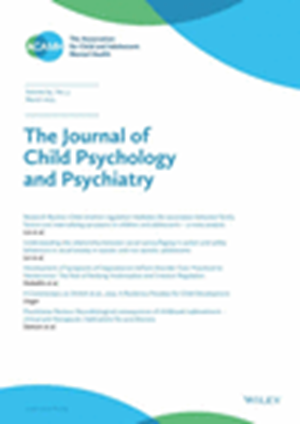ADHD的发展轨迹是由社会环境塑造的吗?母亲对学龄前延迟厌恶起源影响的纵向研究
IF 6.5
1区 医学
Q1 PSYCHIATRY
引用次数: 0
摘要
注意缺陷/多动障碍(ADHD)通常归因于遗传和/或产前/围产期环境的神经认知缺陷。Sonuga‐Barke提出了另一种说法,认为ADHD行为是延迟厌恶的功能性表达——一种强烈的动机倾向,以避免或逃避由延迟引起的消极情感状态。据推测,这种倾向的强度,虽然是神经生物学上的根源,但在与等待相关的遭遇中,早期的负面社会互动会加剧。本文报告了一项初步的概念证明研究的结果,该研究在非临床样本中专门测试了这一假设。方法学龄前儿童(n = 112;平均年龄= 46.2个月)和他们来自英国伦敦和香港的父母参加了一项纵向研究。亲子延迟挫折任务(PC - DeFT)和两个非等待控制任务在基线时进行。观察儿童的表现、行为和情绪反应以及家长的反应。教师在基线和随访(12-18个月后)对儿童的ADHD行为和延迟厌恶进行评分。结果在PC - DeFT期间,儿童的适应不良表现和父母的负面反应基线相互相关,并与教师对ADHD和延迟厌恶的评分相关。在PC - DeFT的基线阶段,父母的消极反应预示着教师评价的ADHD行为在随访时的增加,但在非等待任务中,父母的基线反应没有观察到类似的关联。儿童ADHD症状的增加与父母在基线时的负面反应相关,在统计学上由延迟厌恶介导。这些纵向影响在英国和香港的样本中是一致的。研究结果首次证明,父母对学龄前儿童试图管理延迟的负面反应与多动症行为的增加有关,并与延迟厌恶情绪的增加有关。他们强调了早期社会环境对ADHD行为发展轨迹的潜在重要性。未来的临床研究将在更长的时间框架内使用一系列不同的厌恶环境(即难以完成的任务)。本文章由计算机程序翻译,如有差异,请以英文原文为准。
Are ADHD trajectories shaped by the social environment? A longitudinal study of maternal influences on the preschool origins of delay aversion
BackgroundAttention‐deficit/hyperactivity disorder (ADHD) is commonly attributed to neuro‐cognitive deficits of genetic and/or prenatal/perinatal environmental origins. Sonuga‐Barke proposed an alternative formulation, suggesting that ADHD behaviors are functional expressions of delay aversion—a strong motivational disposition to avoid or escape negative affective states evoked by delay. It is hypothesized that the strength of this disposition, though neuro‐biologically rooted, is exacerbated by early negative social interactions during waiting‐related encounters. This paper reports findings from an initial proof‐of‐concept study that specifically tests this hypothesis in a nonclinical sample.MethodsPreschoolers (n = 112; mean age = 46.2 months) and their parents from London, UK, and Hong Kong participated in a longitudinal study. The Parent–Child Delay Frustration Task (PC‐DeFT) and two nonwaiting control tasks were administered at baseline. Children's performance, behavioral and emotional responses, and parents' reactions were observed. Teachers rated children's ADHD behaviors and delay aversion at baseline and follow‐up (12–18 months later).ResultsAt baseline, children's maladaptive performance and parental negative reactions during the PC‐DeFT were correlated with each other and with teacher ratings of ADHD and delay aversion. Negative parental reactions during the PC‐DeFT at baseline predicted an increase in teacher‐rated ADHD behaviors at follow‐up, but similar associations were not observed for baseline parental responses in the nonwaiting tasks. The increase in child ADHD symptoms associated with negative parental reactions at baseline was statistically mediated by delay aversion. These longitudinal effects were consistent across the UK and HK samples.ConclusionsThe findings provide the first evidence that parent's negative reactions to preschooler's attempts to manage delay are associated with increases in ADHD behaviors overtime, and linked to delay aversion increases. They underscore the potential significance of the early social environment as a contributor to developmental trajectory of ADHD behaviors. Future studies with clinical samples over an extended time‐frame using a range of different aversive environments (i.e. difficult tasks to complete) are indicated.
求助全文
通过发布文献求助,成功后即可免费获取论文全文。
去求助
来源期刊
CiteScore
13.80
自引率
5.30%
发文量
169
审稿时长
1 months
期刊介绍:
The Journal of Child Psychology and Psychiatry (JCPP) is a highly regarded international publication that focuses on the fields of child and adolescent psychology and psychiatry. It is recognized for publishing top-tier, clinically relevant research across various disciplines related to these areas. JCPP has a broad global readership and covers a diverse range of topics, including:
Epidemiology: Studies on the prevalence and distribution of mental health issues in children and adolescents.
Diagnosis: Research on the identification and classification of childhood disorders.
Treatments: Psychotherapeutic and psychopharmacological interventions for child and adolescent mental health.
Behavior and Cognition: Studies on the behavioral and cognitive aspects of childhood disorders.
Neuroscience and Neurobiology: Research on the neural and biological underpinnings of child mental health.
Genetics: Genetic factors contributing to the development of childhood disorders.
JCPP serves as a platform for integrating empirical research, clinical studies, and high-quality reviews from diverse perspectives, theoretical viewpoints, and disciplines. This interdisciplinary approach is a key feature of the journal, as it fosters a comprehensive understanding of child and adolescent mental health.
The Journal of Child Psychology and Psychiatry is published 12 times a year and is affiliated with the Association for Child and Adolescent Mental Health (ACAMH), which supports the journal's mission to advance knowledge and practice in the field of child and adolescent mental health.

 求助内容:
求助内容: 应助结果提醒方式:
应助结果提醒方式:


